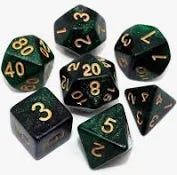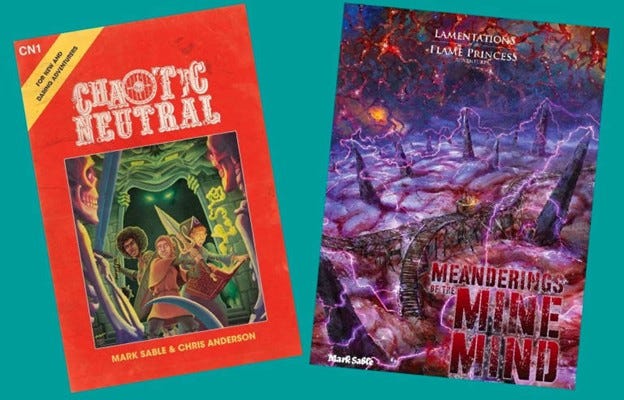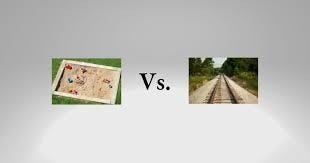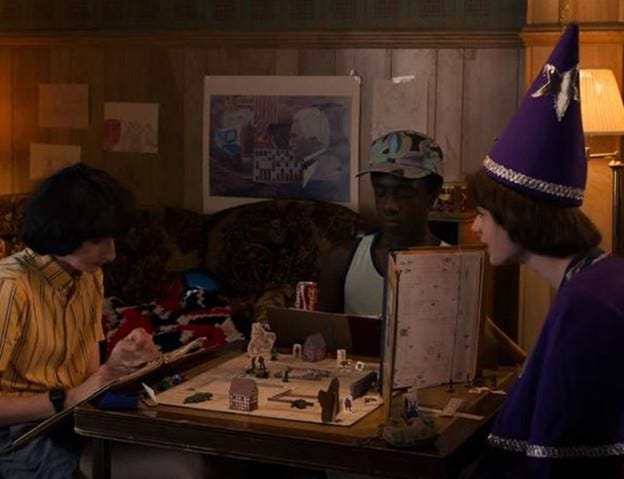Mark Sable Newsletter February 2025
This month’s newsletter is dedicated to role-playing games. As I’ve mentioned in the last two newsletters, I’ll be teaching Writing for Roleplaying Tabletop Role-Playing Games, an online continuing education class through the School of Visual Arts. Open to everyone, everywhere, it starts February 13th and you can sign up here.
But I realize that many - maybe even most of you – may not know what a role-playing game like Dungeons & Dragons is, let alone why you might want to learn how to write for one.
WHAT IS A ROLE-PLAYING GAME?
The most user-friendly explanation I’ve seen is in this YouTube video for Jon Bernthal (The Walking Dead, Punisher)’s The Hot Ones, where actress Deborah Ann Woll (Daredevil) shows him how to play. I just love the look of genuine awe on Bernthal’s face as he realizes both how simple and wondrous role-playing can be:
For those of you that don’t have the time or inclination to watch the video, I’ll start with Wikipedia’s definition and break it down from there : “A role-playing game (RPG) is a game in which players assume the roles of characters in a fictional setting.”
Players play characters other than themselves and use a set of rules - like Dungeons & Dragons (D&D), Mothership or Call of Cthulhu etc. – to determine what their character can and can’t do. Playing mostly involves making decisions – from “do I go left or right in a dungeon”, to “how do I fight, or persuade, deceive or intimidate an enemy” – but also a bit of acting.
A gamemaster (GM) - or Dungeon Master (DM) in the case of D&D operates as a sort of referee, adjudicating the rules.
But GMs do more than that. They present – and often create – the adventure that the players embark upon each session. They act out the roles of all the characters that the players don’t, or what are referred to as NPCs (Non-Player Characters). Those can be anyone from medieval tavernkeepers to corporate bureaucrats to monsters from beyond space and time.
Unlike most tabletop or video games, role playing games are usually cooperative rather than competitive, and don’t always have a concrete “win” condition. Players and GMs may set goals – exploring the wilderness, escaping from a prison planet, confronting a villain etc. - but the real goal is telling a story through the choices and actions of the participants and characters.
The complexity of the rules will vary from game to game, but success or failure is usually determined by rolling a set of dice. Similarly, how much acting a player or DM does is going to be up to induvial taste. Most people like me tend to run more casual games but shows like Critical Roles often feature voice actors who take their roles as seriously as if it were a SAG job.
WHY DO ROLE-PLAYING GAMES NEED WRITERS?
You may be asking, if you have rules, why do you need to write? After all, with most games, whether it be Monopoly or a video game, you can just sit down and play.
Strictly speaking, you don’t really need more than a rulebook to run or play game. But that means that the GM is going to have to do a lot of prep work in creating an adventure for the players for that session, perhaps even creating a world for a series of sessions (referred to as a campaign).
As a result, there’s an entire industry devoted to pre-made adventures. They are called modules, because ideally, they are modular and can be inserted into anyone’s campaign. Their purpose is to give GMs a way to run an adventure or series of adventures with little or no-prep.
I’ve written two adventure modules, MEANDERINGS OF THE MINE MIND (available here) and CHAOTIC NEUTRAL (available here). Both are designed for older editions of Dungeons & Dragons but roughly compatible with just about any fantasy role playing game.
CHAOTIC NEUTRAL is combination comic book and adventure module, involving a village where townsfolk are being sacrificed to demons. MEANDERINGS OF THE MINE MIND involves exploring a 17th century silver mine that is really the mind of a giant, alien god.
What differentiates these from stories I’ve written is that, rather than tell a linear narrative, they present situations where the players create the story through the choices they make. They can stop devil-worshipping cultists or make a deal with a demon; raid the mine for silver, rescue trapped miners or awaken an eldritch horror. Or, they may decide to pursue goals that I haven’t even conceived of.
My job as an RPG writer is to create a scenario, but every gamemaster is likely to interpret that scenario differently, and every group of players will have a unique play experience.
WHAT DOES WRITING FOR A ROLEPLAYING GAME ENTAIL?
Because of the open-ended nature of role-playing games, I have a fundamentally different approach for designing RPG adventures than I do for writing comics, films or TV. When I started teaching my game writing class, I basically had to throw out just about everything I'd taught for narrative writing in the past 15 or so years.
What makes good narrative writing on a structural level is having a story where relatable but flawed protagonist overcome obstacles in pursuit a concrete goal. Embracing the force to blow up the Death Star, overcoming indecision to get revenge on the Danish King that murdered their father and married their mother. Basically, some variation of three-act structure. During that process, the protagonist either overcomes that flaw (most films), or fails to (tragedies).
But great role-playing and other interactive experiences don’t involve narratives imposed by an author. Instead, the story to a largely emerges from the choices that a player makes. Player choice and “emergent narrative” are what, to me, makes gaming a unique medium.
When writers try to graft three-act structure etc. on roleplaying games, I think those gaming experiences tend to be less satisfying. One metaphor that I’ve found useful is that of a sandbox vs. a railroad.
A sandbox is a game where you give the player an area with a set of tools and obstacles to play with. It affords them a great deal of choice. The players then wind up crafting their story, informed by their choices and then the game and the gamemaster’s reaction to those choices.
A railroad, on the other hand, is where there is a linear narrative and “on-the-rails” experience, with no real choices. That can be something as simple as a Super Mario Brothers where you are going from level to level without any say in the matter, but also most computer or video game RPGs where you are given a defined character that has a set path, which you must follow, or else fail.
WHY A CLASS?
I created my RPG class last year so that, if you have any interest in writing for roleplaying games, I can help you write adventures that play to the strengths of the medium.
RPGs have become increasingly popular, in large part due to their presence in pop cultural phenomena like Stranger Things. So, if you’re a writer or aspiring writer, it’s an entirely new medium to explore.
But even if you don’t want to write professionally, my class is a good way to learn how to better run or even play roleplaying games.
I was pleasantly surprised that, when I first offered the course last year, I had students who had never played an RPG before. At first it seemed strange, like signing up for a screenwriting class without ever having seen a movie.
But I quickly realized that running and playing role-playing games teach skills that are applicable to host of other creative endeavors: writing, strategic decision making, balancing teamwork and competition, acting, improvisation, and even math in the form of probability and statistics.
Am I trying to get you to take my class? Yes. But even if you don’t or can’t, I think there’s tremendous value in playing role-playing games. I first started playing them as a child and then came back to them about 10 years ago, running a weekly Dungeons & Dragons game online, before writing and publishing adventures professionally.
I credit my return to RPGs for reigniting my imagination, resulting in increased creativity and productivity. Not to mention an escape from the pandemic and other difficult times. Whether you take my class or not, if you try an RPG, I very much hope it brings you the same enjoyment and fulfilment.
-Mark









